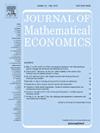管理预期和参考选择
IF 1
4区 经济学
Q3 ECONOMICS
引用次数: 0
摘要
大量的现场和实验证据表明,参照点会影响行为。但是,是什么影响了参照点呢?文献中提出的候选参考点包括现状、理性预期以及梦想或担心单一可能结果的狭隘关注点。本文建立了一个包含所有这些候选来源的模型。它允许参考点是消费抽签可能结果的任何凸组合。我们为依赖参考点的选择引入了新的求解概念,在选择数据的层面上描述了这些求解概念,并确定了模型的参数。本文章由计算机程序翻译,如有差异,请以英文原文为准。
Managing anticipation and reference-dependent choice
Extensive field and experimental evidence shows that reference points shape behavior. But, what shapes the reference point? Candidates put forward in the literature range from the status quo, to rational expectations and the narrow focus of dreaming or worrying about a single possible outcome. This paper develops a model that includes all of these candidate sources. It does so, by allowing the reference point to be any convex combination of the outcomes possible under a consumption lottery. We introduce new solution concepts for reference-dependent choices, characterize these solution concepts on the level of choice data and identify the model’s parameters.
求助全文
通过发布文献求助,成功后即可免费获取论文全文。
去求助
来源期刊

Journal of Mathematical Economics
管理科学-数学跨学科应用
CiteScore
1.70
自引率
7.70%
发文量
73
审稿时长
12.5 weeks
期刊介绍:
The primary objective of the Journal is to provide a forum for work in economic theory which expresses economic ideas using formal mathematical reasoning. For work to add to this primary objective, it is not sufficient that the mathematical reasoning be new and correct. The work must have real economic content. The economic ideas must be interesting and important. These ideas may pertain to any field of economics or any school of economic thought.
 求助内容:
求助内容: 应助结果提醒方式:
应助结果提醒方式:


